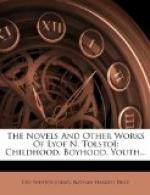“What are you doing?” said Woloda, who had seen my behaviour, and now approached me in alarm and astonishment.
“Let me alone!” I exclaimed, the tears flowing fast. “Not a single one of you loves me or understands how miserable I am! You are all of you odious and disgusting!” I added bluntly, turning to the company at large.
At this moment St. Jerome—his face pale, but determined—approached me again, and, with a movement too quick to admit of any defence, seized my hands as with a pair of tongs, and dragged me away. My head swam with excitement, and I can only remember that, so long as I had strength to do it, I fought with head and legs; that my nose several times collided with a pair of knees; that my teeth tore some one’s coat; that all around me I could hear the shuffling of feet; and that I could smell dust and the scent of violets with which St. Jerome used to perfume himself.
Five minutes later the door of the store-room closed behind me.
“Basil,” said a triumphant but detestable voice, “bring me the cane.”
XV. DREAMS
Could I at that moment have supposed that I should ever live to survive the misfortunes of that day, or that there would ever come a time when I should be able to look back upon those misfortunes composedly?
As I sat there thinking over what I had done, I could not imagine what the matter had been with me. I only felt with despair that I was for ever lost.
At first the most profound stillness reigned around me—at least, so it appeared to me as compared with the violent internal emotion which I had been experiencing; but by and by I began to distinguish various sounds. Basil brought something downstairs which he laid upon a chest outside. It sounded like a broom-stick. Below me I could hear St. Jerome’s grumbling voice (probably he was speaking of me), and then children’s voices and laughter and footsteps; until in a few moments everything seemed to have regained its normal course in the house, as though nobody knew or cared to know that here was I sitting alone in the dark store-room!
I did not cry, but something lay heavy, like a stone, upon my heart. Ideas and pictures passed with extraordinary rapidity before my troubled imagination, yet through their fantastic sequence broke continually the remembrance of the misfortune which had befallen me as I once again plunged into an interminable labyrinth of conjectures as to the punishment, the fate, and the despair that were awaiting me. The thought occurred to me that there must be some reason for the general dislike—even contempt—which I fancied to be felt for me by others. I was firmly convinced that every one, from Grandmamma down to the coachman Philip, despised me, and found pleasure in my sufferings. Next an idea struck me that perhaps I was not the son of my father and mother at all, nor Woloda’s brother, but only some unfortunate orphan who had been adopted by them out of compassion, and this absurd notion not only afforded me a certain melancholy consolation, but seemed to me quite probable. I found it comforting to think that I was unhappy, not through my own fault, but because I was fated to be so from my birth, and conceived that my destiny was very much like poor Karl Ivanitch’s.




